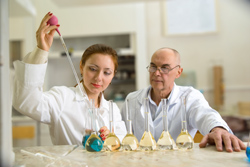Europe boosts expertise for the University of Sofia
Considered the primary institution of higher education in the capital, Sofia University is liaising with the European Commission to boost its expertise in certain fields. In particular, an EU-sponsored team recently evaluated the research quality and capability of the university's faculty of chemistry. A team of five independent evaluators were selected by the European Commission to undergo a SWOT analysis of the faculty. SWOT stands for strengths, weaknesses, opportunities and threats. It is considered an important tool in the drive for upgrading and advancing any organisation or institution. Several challenges were identified as priorities in the SWOT analysis, in coordination with both the evaluators and faculty members. Interestingly, one of these was the high number of teaching hours (180 to 360\;hours/year) compared to the European average of 120\;hours/year. Moreover, lack of funding for maintenance and infrastructure, as well as lack of equipment have been identified as major issues. A need to hire highly experienced professionals was also underlined. Other issues to address are lack of post-doctorate opportunities for students and lack of international experience of young scientists. The SWOT analysis has already been used to prepare an action plan for future development and improvement of the faculty. The final version of the action plan was approved by the faculty's steering committee at the end of the project. The plan was even recommended for dissemination among the other faculties of the Sofia University as a model of good practice. In the plan, the independent experts issued recommendations to both the university management and the state authorities on how to improve Bulgarian science and research policy. The evaluators concluded overall that, considering the lack of advanced equipment and infrastructure, research output and international cooperation are strong, reflecting high competence in different fields. Once the plan is implemented, the likelihood of the faculty becoming a global player in its field, on par with other European universities, will help catapult Bulgaria to much higher ground in this respect.



